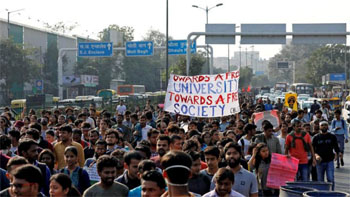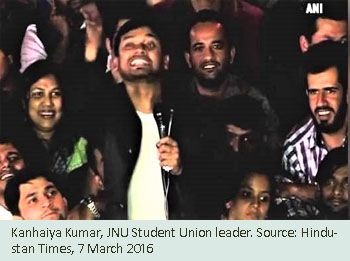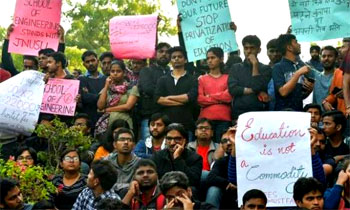|
The Lynching of JNU
Vinay Lal
Jawaharlal Nehru University, or JNU as it is known in Delhi and beyond, has once again been in the news for the last three weeks. Its students have been protesting not only against large hikes in hostel fees, but against other features of the draft hostel manual which imposes a dress code and sets a curfew for students. The university and nearby residential colonies have been swarming with police, but the students have been successful in taking their demonstrations to many parts of central Delhi and the area around Parliament. There are reliable reports, and video footage, of students, including some who are disabled, who have been beaten by the police. Students have been lathi charged, and many have been detained. The Delhi Police has, predictably, denied all charges of police brutality, and rests its case upon the fact that the imposition of Section 144 of the Indian Penal Code, which outlaws’ public assemblies of more than five people, means that the protestors are in violation of the law.

JNU has long been one of the country’s most distinguished universities. That, some might argue, says little considering that no Indian university, going by the Times’ Higher Education World University Rankings (2020), ranks within the world’s top 300 institutions of higher education, and JNU falls within the 601-800 rankings. Even within Asia alone, JNU is ranked a measly 95th. Nevertheless, the university has exercised an outsized influence in Indian public and intellectual life, and some of its graduates have gone on to gain global renown. JNU justly celebrated the award of the 2019 Nobel Prize in Economics to one of its graduates, Abhijit Banerjee, and a number of its graduates now occupy very high positions in the present government and the civil services.
Such rankings should, in any case, be treated be severe scepticism if not dismissed outright. JNU has much else to its credit, all of which has made it the target of the present government and the university administration headed by a Vice Chancellor who has shown himself utterly incapable of exercising independent judgment. More than any other university in the country, JNU remains a site of dissent. Whatever distinctions its graduates and faculty have earned in the academic sphere, in scientific research, or in public life, many of them have shown that in a modern civilized society it is imperative that the university be safeguarded as one of the last bastions of free speech and dissent. Four years ago, the government attempted to silence some PhD students—among them, Kanhaiya Kumar, Umar Khalid, and Anirban Bhattacharya—by charging them with sedition and criminal conspiracy, for no better reason than they had held a demonstration against the sentence of capital punishment that had been handed out to Afzal Guru, convicted of an attack on the Indian Parliament.

The culture of dissent, and independent thinking, cannot however by gauged only by an occasional show of protest, and what makes JNU stand out is the spirit of inquiry which informs intellectual and cultural life on campus. This was demonstrated, in the aftermath of the government’s heavy-handed and much critiqued handling of the sedition case, by an extraordinary series of lectures on nationalism that were held outside the administration building. The BJP government has sought, since it came to power in 2014, to capture nearly every state institution, and its inability to silence students at JNU has doubled its resolve to bring the university to heel. JNU’s students are similarly emboldened to stand their ground, indeed for reasons that the government fears and cannot dare to acknowledge. JNU is unique in that it draws half of its student body from families that live at the edge of poverty, living on Rs 12,000 or less a month. There are students whose fathers work as hawkers and landless laborers, and in hazardous industries as daily wage laborers. The supposition of the government, of course, is that such students have no reason to study; they certainly have no right to dream of a better livelihood than their parents.

If all of this were not enough to bring distinction to JNU, there is yet something more that makes the university absolutely singular in India. It is doubtless the first university to be publicly lynched. The country has been witnessing for the last several years to many lynchings of Muslims and Dalits. Make hay while the sun shines, so goes the proverb, and some Hindu nationalists have been on the rampage knowing fully well that that they can commit, with full impunity, heinous crimes. The idea of an institution being “lynched” may strike some as bizarre, but I doubt very much that the public lynching of JNU has any parallels in modern Indian history. It may well be JNU’s misfortune that, being named after Jawaharlal Nehru, and having, on top of that, something of a reputation (deservedly or otherwise) as a left-wing institution, it was bound to exercise the attention of the present government, which absolutely loathes the name of Nehru and has lost no opportunity to ridicule the achievements and legacy of India’s first and longest serving Prime Minister. Most recently, BJP Vice President Shivraj Singh Chouhan has charged Nehru with the “crime” of introducing Article 370 and “announcing ceasefire in war with Pakistan”, a view at once endorsed by Bhopal BJP MP Pragya Thakur who agrees that Nehru, having hurt “our motherland”, was “surely” a “criminal”. Thakur, we should remember, spent nearly a decade in jail on charges of being a terrorist and is technically still out on bail. One might speak of the pot calling the kettle black, but such proverbs would be lost on the illiterates who now command India’s destiny.
The government, having done whatever it deemed necessary to tame JNU, has now left the shaming and lynching of the university to the country’s middle class. We all know of the television anchor whose trademark harangue, which would be comical if it were not so incendiary, begins with this line: “The country wants to know . . .” JNU students are now routinely accused of being anti-national, an allegation which makes a traitor of anyone who does not subscribe to the idea of Hindu supremacy. But the demonization of JNU students has many other, equally disturbing, features. A BJP MLA from Rajasthan’s Alwar District had claimed, following the arrest of Kanhaiya Kumar, that “3,000 used condoms, 500 used abortion injections, 10,000 cigarette pieces, among other things,” are found at JNU “daily”, and that “girls and boys dance naked in cultural programmes” at the university.

What he claimed then is now claimed by thousands of middle class Indians posturing as guardians of public morals who are convinced that JNU is a den of vice: here girls dance naked and they are shameless in flaunting their bodies, both girls and boys are hooked on drugs, and university hostels are little better than places where sex can be had for the cheap. JNU students, it is being said, are generally engaged in worthless research and are, in any case, much too old to be students. Social media is awash with such stories. One story doing the rounds on Facebook, shared 1,400 times within hours of it being posted, represented a 43-year old woman as a student whose daughter was also a student at JNU! The story circulated with the hashtag, #ShutDownJNU. The 43-year old woman was a figment of the imagination.

Those agitating for the closure of JNU, or stern disciplinary action against students, are pathetic for yet other reasons. Some of them have taken recourse to the argument, drawn entirely from the playbook of American populism, that JNU is a drain on public resources and that “tax-payers” should not have to subsidize lazy, old, and left-inclined students so that they can write on worthless topics which do nothing for the country’s economy. The sheer poverty of such thinking is what should alarm the country. This is apart from the fact that India’s middle class is notorious for tax evasion, and it can be safely said that many objecting to the waste of tax-payers’ money are evading the payment of their own taxes. India has a seriously ailing economy. As the loud shouting against JNU shows, what ails the imagination in India is equally frightening.
[Vinay Lal is Professor of History and Asian American Studies at UCLA. He writes widely on the history and culture of colonial and modern India, popular and public culture in India, historiography, the politics of world history, the Indian diaspora, global politics, contemporary American politics, the life and thought of Mohandas Gandhi, Hinduism, and the politics of knowledge systems.]
Courtesy: https://vinaylal.wordpress.com/2019/11/22/the-lynching-of-jnu/
Back to Home Page
Frontier
Nov 27, 2019
Prof. Vinay Lal VLAL@HISTORY.UCLA.EDU
Your Comment if any
|
|
